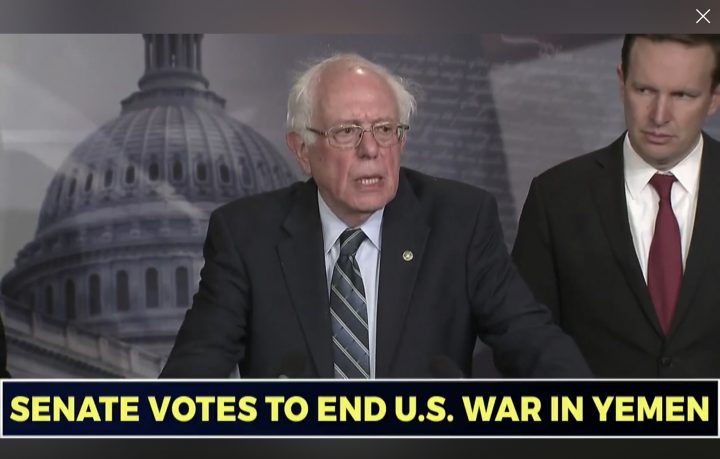
In December 2018, the US Senate passed Bernie Sanders’ resolution to halt military support to Saudi Arabia’s assault on Yemen with a bipartisan vote of 56-41.
House Passes Amendments to End War Authorizations, Preemptively Defund Iran War
Jason Ditz /AntiWar.com
(July 12, 2019) — The flurry of amendments to the 2020 National Defense Authorization Act (NDAA) moving through the House of Representatives is finally wrapping up Friday, where a series of Thursday night debates gave way to key votes early Friday on some contentious issues.
Major subjects of those debates included amendments that aim to end both the 2001 and 2002 Authorizations for Use of Military Force (AUMF). The 2001 repeal passed 237-183, while the 2002 repeal passed even easier at 242-180.
Debates on the AUMF centered on concern that the authorizations could be used by President Trump or future presidents to authorize wars they were never intended for. The aim is to replace the 2001 version with something more current on the global war on terror, and to do away with the 2002 version entirely, since its main goal was to unseat the long-dead Saddam Hussein and conquer Iraq, now a US ally.
Opponents of the repeals argued it would tie President Trump’s hands, and that other recent presidents have gotten to launch unauthorized wars without Congress getting in the way.
Which was also a big topic of the debate for another amendment, the preemptive defunding of any US attack on Iran that comes without an explicit Congressional authorization. This passed 250-170.
Bill supporters argued that Iran is just too big of a war to get sucked into without Congress having any say in the matter, while opponents insisted that Congress is so slow in approving wars we’d never get an attack on Iran off the ground without a president doing it unilaterally.
This was a particularly important vote because President Trump has argued he doesn’t need Congressional authorization to attack Iran. While that’s legally incorrect, he may have been de facto right, since he’s been vetoing War Powers Act challenges to other unauthorized wars. Congress thus is using the power of the purse to ensure that there is no money allowed to be spent on such an illegal war.
These amendments join several others passed on Thursday, including amendments blocking arms sales to Saudi Arabia, and the defunding of the US war in Yemen, the subject of the aforementioned War Powers challenges.
Once passed in the House, the NDAA will have to be reconciled with the Senate version, which doesn’t include a number of these amendments. The House, however, is expected to stand firm on these matters. President Trump has threatened to veto the House version, which could mean that the NDAA remains up in the air, as Congress may try to override, or see which side blinks first.
The NDAA ultimately passed 220-197.

House Votes to End War with Iraq, Prevent War with Iran
Timothy McHugh / Friends Committee on National Legislation
(July 12, 2019) — The Friends Committee on National Legislation (FCNL) applauded today’s House votes repealing the 2002 Authorization for Use of Military Force Against Saddam Hussein’s Iraq (2002 AUMF) and preventing a new unauthorized war with Iran.
Contact: Tim McHugh, Friends Committee on National Legislation, media@fcnl.org; 202-903-2515
“This landmark pair of victories signals a turning-point in the Congressional tide away from war and toward the path of peace,” said Diane Randall, FCNL executive secretary. “Our Quaker faith tells us that war is never the answer, and it’s becoming increasingly clear that both the American people and their elected representatives agree.”
Voting 242-180, the House adopted Rep. Barbara Lee’s (CA) amendment to repeal the 2002 AUMF. The 17-year-old law solely authorized war against Hussein’s Iraqi regime. Both the Trump and Obama administrations hold that the 2002 AUMF does not authorize any activities that are not already covered by the 2001 AUMF, passed after the 9/11 attacks.
In addition, the House approved 251-170 a bipartisan amendment sponsored by Reps. Ro Khanna (CA) and Matt Gaetz (FL) to prohibit spending on military action against Iran unless such action has been specifically authorized by Congress or in the event of a national emergency created by an attack upon the United States.
“The 2002 AUMF is an unnecessary and redundant law, yet keeping it on the books leaves it vulnerable to abuse from the executive branch,” explained Heather Brandon Smith, FCNL’s legislative director for militarism and human rights. “Repealing the 2002 AUMF protects against this or any future president exploiting it to justify unforeseen and unauthorized new wars.”
Since early 2019, FCNL has mobilized thousands of people of faith to repeal the AUMF and tell Congress that they don’t want another senseless war.
“The administration’s approach of maximum pressure against Iran has been a dismal failure and could escalate into another deadly Middle East conflict,” said Smith. “There is a better way to protect our national security, and that is through diplomacy and international cooperation.”
Today’s votes follow the House approval of a measure to repeal the 2001 AUMF, which was included in a defense funding bill. The approved House defense bill must now be conferenced with the Senate’s version.
To learn more, please visit www.fcnl.org.

The House Rebukes Trump on Yemen Again
Daniel Larison / The American Conservative
(July 12, 2019) — The House passed two amendments to the defense authorization bill yesterday related to the war on Yemen. The first prohibited the administration from using funds to support the Saudi coalition:
But the most consequential amendments on Thursday continued Congress’s months-long effort to intervene in the Yemen conflict and punish Saudi Arabia for the murder of the dissident Washington Post columnist Jamal Khashoggi.
Lawmakers voted 236 to 193 to prohibit the administration from using funds to support the Saudi-led military operations — either with munitions or with intelligence — against the Houthis in Yemen, a conflict that has killed thousands of civilians and resulted in a widespread famine in what the United Nations calls the world’s worst humanitarian crisis.
The other amendment blocked the arms sales related to the bogus “emergency” declared by the Trump administration:
In an answer to the administration’s decision in May to declare an emergency over Iran in order to sell arms to Saudi Arabia and the United Arab Emirates against Congress’s wishes, the House on Thursday voted 246 to 180 on a measure by Representative Ted Lieu, Democrat of California, to block those sales. The emergency declaration infuriated lawmakers from both parties in both the House and the Senate.
The passage of the amendment on arms sales shows that majorities in both houses are clearly opposed to Trump’s abuse of power in declaring the phony “emergency” to provide Saudi Arabia and the UAE with more weapons. The Senate had previously passed resolutions of disapproval to oppose these arms sales and the president’s attempt to circumvent Congress.
The passage of the amendment barring the use of funds to support the Saudi coalition shows that the House majority is not giving up on the effort to end US involvement in the war on Yemen.
Opposition to the war hasn’t waned, and thanks to Rep. Ro Khanna the House keeps rebuking Trump over his shameful ongoing support for the Saudi coalition. The House has proven it is willing to use the power of the purse to halt US involvement in an unauthorized foreign war, and that is an important reassertion of a Congressional power that usually lies dormant when it comes to our government’s illegal wars.
There is a chance that these amendments will survive in the final bill after the House and Senate reconcile their different versions, and if that happens Trump would have to veto the entire defense authorization bill to continue enabling the Saudi coalition’s atrocious war.
Daniel Larison is a senior editor at The American Conservative, where he also keeps a solo blog. He has been published in the New York Times Book Review, Dallas Morning News, Orthodox Life, Front Porch Republic, The American Scene, and Culture11, and is a columnist for The Week. He holds a PhD in history from the University of Chicago, and resides in Dallas. Follow him on Twitter. This article is reprinted from The American Conservative.
Posted in accordance with Title 17, Section 107, US Code, for noncommercial, educational purposes.